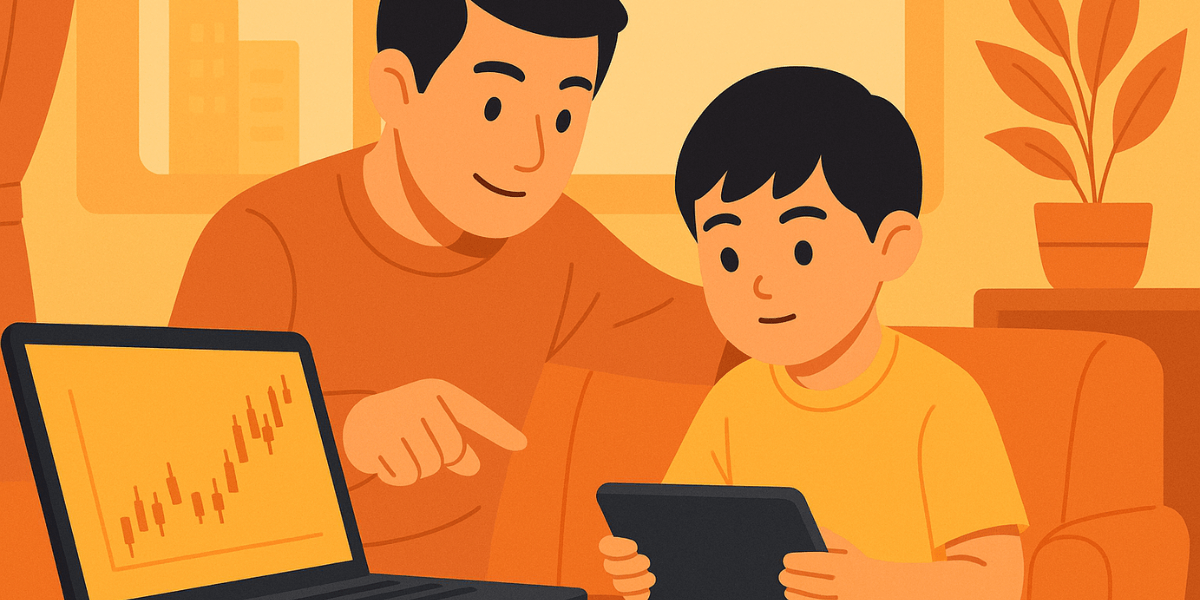Fear and greed are often described as the twin pillars of trading psychology, and for good reason. They are the emotional extremes that shape nearly every decision a trader makes, whether consciously acknowledged or unconsciously acted upon. In the context of forex, where markets move twenty-four hours a day and decisions must often be made in seconds, the impact of these emotions is amplified. A single fearful hesitation can mean missing a profitable entry, while a moment of unchecked greed can wipe out weeks of careful gains in one poorly sized position. Understanding these emotions is not just an academic exercise; it is central to survival and eventual success in the highly competitive world of foreign exchange.
Origins of Fear and Greed in Trading
At its core, fear in trading is tied to loss aversion, a well-documented cognitive bias in behavioral finance. Humans are naturally wired to feel the pain of loss more strongly than the pleasure of equivalent gain. Losing $100 hurts significantly more than winning $100 feels good. This imbalance creates a skewed emotional reaction in forex trading: traders might close winning trades prematurely because they fear a reversal, or they may refuse to enter a position that aligns perfectly with their system because memories of previous losses dominate their thinking. Over time, this avoidance behavior can create a pattern of underperformance, even when the trader has a statistically sound strategy.
Greed, on the other hand, often emerges after success. A few winning trades can convince a trader that they are on a hot streak or that they have somehow “mastered” the market. Instead of continuing to follow their plan, they increase position sizes recklessly, ignore stop-loss levels, or add to losing positions in the hope of a rebound. Greed convinces the trader that more is always possible, that this time will be different, and that risk controls can be bent without consequence. Yet history and countless blown accounts show that greed is just as dangerous as fear, because it tempts traders to pursue outcomes that markets rarely deliver—consistent outsized profits without proportional risk.
One reason fear and greed persist so strongly in forex is the nature of the market itself. The forex market is decentralized, highly liquid, and deeply influenced by global events. News releases, central bank announcements, and geopolitical shocks can create violent volatility in seconds. In such an environment, emotions naturally run high. A trader who watches EUR/USD spike 80 pips in a minute after a surprise CPI print may feel the adrenaline surge of greed (“I must jump in to catch the move”) or the paralysis of fear (“If I trade now, I’ll lose everything”). Without pre-defined rules and a disciplined framework, both reactions can lead to irrational behavior.
Another layer to consider is the social and cultural dimension of trading emotions. Traders are not isolated individuals; they exist within online forums, social media groups, and sometimes within trading desks where others’ opinions constantly flow. Seeing another trader boast about doubling their account in a week can fuel greed by triggering the fear of missing out (FOMO). Conversely, hearing stories of catastrophic losses can heighten fear and create an exaggerated sense of risk. These external influences magnify the internal tug-of-war, making it even more important for traders to anchor themselves in objective data and personal risk management principles rather than the noise of others’ experiences.
Moreover, fear and greed often do not act alone—they cycle and reinforce one another. A trader who enters a position greedily, hoping for extraordinary profits, may experience overwhelming fear when the market moves against them. If they panic and close at a loss, the sting of that fear may make them hesitant to take the next valid setup. When they finally re-enter, greed might once again take control, pushing them to “make back” losses quickly. This vicious cycle not only drains financial resources but also depletes psychological resilience. The trader ends up exhausted, discouraged, and often out of the market altogether.
To break free from this cycle, traders must acknowledge that emotions cannot be eliminated. No matter how experienced, every trader will feel fear and greed at different times. The real challenge is to design systems and routines that regulate these emotions. This involves blending self-awareness with structural guardrails: journaling trades to identify patterns, pre-defining entry and exit rules, sizing positions according to volatility, and enforcing daily limits that prevent emotional spirals. By embedding these routines, traders can convert raw emotion into controlled energy—fear becomes caution that ensures proper risk controls, and greed becomes ambition channeled into disciplined strategy execution.
The introduction of risk management concepts such as the Kelly Criterion, position sizing models, and expectancy frameworks can also provide rational counterweights to emotions. When traders understand mathematically how much they can risk per trade without jeopardizing their long-term survival, fear loses some of its grip. Similarly, when they see through journaling that consistent small gains compound more effectively than sporadic big wins, greed loses some of its allure. Over time, rational evidence builds psychological confidence, creating a mindset where fear and greed are still present but no longer dominant.
Understanding Fear in Forex Trading
Fear in forex manifests in several ways. For new traders, it often begins as hesitation—the reluctance to enter trades even when setups align perfectly. For experienced traders, fear often shows up after a string of losses, making them overly cautious and paralyzed when the next opportunity arises. Fear is also visible in the tendency to tighten stops too early, cutting winners before they can run.
Fear is not irrational; it is the brain’s natural defense mechanism against perceived threats. In trading, the “threat” is financial loss and the reputational or psychological pain that comes with it. However, markets operate on probabilities, and no setup is ever guaranteed. By reframing losses as business expenses and focusing on long-term expectancy rather than single outcomes, traders can reduce the power of fear. Journaling, reviewing historical performance, and practicing smaller position sizes are concrete methods to gradually desensitize the mind from the sting of losing trades.
Understanding Greed in Forex Trading
Greed represents the opposite force. Instead of fear of losing, greed is the insatiable desire for more—more profits, more trades, and faster results. It drives traders to hold winning trades too long, hoping for a bigger gain, or to increase position size recklessly after a successful streak. Greed often follows short-term success, feeding overconfidence and the illusion of control.
The danger of greed is that it blinds traders to risk. When greed takes over, stop-losses are ignored, leverage is abused, and risk management principles are abandoned. Over time, a single act of greed can wipe out weeks or months of steady gains. This is why seasoned traders emphasize rules such as taking partial profits, sticking to predefined targets, and avoiding impulsive trades. By systematizing profits and embedding humility into trade management, traders can control greed without suppressing ambition.
How Fear and Greed Interact
Fear and greed are not isolated emotions—they feed off each other in cycles. For example, greed may prompt a trader to take on an overly large position. When the market moves against them, fear spikes, causing premature exits or panic selling. This loss then reinforces fear, which leads to hesitation on the next trade. Eventually, an opportunity arises, greed takes over again, and the cycle repeats. Breaking this cycle requires awareness and structured intervention.
Strategies to Overcome Fear
To control fear, traders need a combination of mindset shifts and tactical adjustments:
- Reframe losses: View them as statistical events within a larger series of trades rather than personal failures.
- Reduce position size: Smaller trades lower the emotional weight of losses.
- Build confidence with data: Use backtesting and journaling to prove that strategies work over time.
- Follow a checklist: Structured entry and exit criteria reduce hesitation at decision points.
Strategies to Overcome Greed
Greed can be mitigated with discipline and mechanical controls:
- Set predefined profit targets: Stick to a reward-to-risk ratio and respect partial exits.
- Enforce daily trade limits: Cap the number of trades to avoid compulsive overtrading.
- Automate exits: Use stop-losses and take-profit orders to reduce the temptation to interfere.
- Celebrate consistency: Focus on building equity steadily rather than chasing windfalls.
Building a Balanced Mindset
Overcoming fear and greed is not about erasing emotions—it is about achieving balance. Emotions provide valuable signals: fear can highlight risk awareness, while greed can drive ambition. The key is to regulate these emotions so they remain allies rather than enemies. Traders who build balance develop patience, discipline, and confidence in their systems, leading to a sustainable approach to forex.
Comparison Table: Fear vs. Greed in Forex
| Aspect | Fear | Greed |
|---|---|---|
| Typical Behavior | Hesitation, premature exits | Overtrading, oversized positions |
| Trigger | Past losses, uncertainty | Recent wins, overconfidence |
| Risk | Missed opportunities | Large, sudden losses |
| Solution | Smaller trades, reframing losses | Targets, automation, trade caps |
Practical Techniques for Emotional Control
Beyond mindset, traders can adopt practical routines to strengthen discipline:
- Meditation and mindfulness: Reduce stress and improve clarity before trading sessions.
- Fixed schedule: Avoid trading outside designated hours to prevent impulsive decisions.
- Journaling: Track emotional states alongside trades to identify recurring triggers.
- Accountability partner: Share performance reviews with a mentor or trading peer.
Case Studies: Fear and Greed in Action
Consider a trader who wins three consecutive trades and feels invincible. Driven by greed, they double their next position, only to lose more than they gained in the previous trades. Another trader avoids entering a valid setup after two losses in a row, paralyzed by fear, and then watches the market move exactly as predicted without them. Both examples highlight how unmanaged emotions undermine rational strategy. Structured discipline prevents such extremes by embedding guardrails into the trading process.
Conclusion
In concluding the discussion on fear and greed in forex trading, it is important to recognize that these emotions are not aberrations or weaknesses unique to certain traders; they are universal human responses rooted in evolutionary psychology. Fear once helped humans survive physical threats, while greed encouraged them to pursue resources for future security. In modern financial markets, however, these same instincts often sabotage rational decision-making. The trader who panics at the first sign of volatility or who chases profits without discipline is not flawed as a person—they are simply responding with instincts that were never designed for the probabilistic, abstract world of forex. The solution, therefore, lies not in attempting to suppress emotions altogether, but in building structures, habits, and environments that transform these primal impulses into constructive behavior.
One key element in this transformation is preparation. Traders who arrive at their desks without a plan are far more vulnerable to emotional swings. Fear and greed thrive in uncertainty. If a trader does not know where their entry, stop-loss, and target are before they execute, the market will dictate those choices to them in the heat of the moment. The conclusion to draw here is straightforward: preparation is the antidote to panic. By having a clear plan in place, traders create a buffer between their emotional impulses and their market actions.
Another dimension is accountability. Many traders operate alone, which makes it easier to rationalize emotional decisions. Keeping a trading journal, participating in peer review groups, or working with a mentor introduces external accountability that counterbalances internal impulses. When traders know they must explain their choices to others or record them for future review, they are more likely to act rationally in the present. In this way, accountability becomes a practical tool for emotion management.
Equally important is cultivating patience. Forex markets offer endless opportunities, but not all of them are worth pursuing. Greed often manifests as the compulsion to be in the market at all times, while fear often prevents traders from holding positions long enough for their strategies to play out. Patience resolves both extremes by teaching traders to wait for high-quality setups and to let their trades develop without constant interference. This is easier said than done, but practices like mindfulness, meditation, and scheduled breaks during trading sessions can strengthen the patience muscle over time.
It is also vital to acknowledge the role of risk capital. Fear intensifies when traders risk money they cannot afford to lose, while greed grows when they see trading as a shortcut to wealth rather than a disciplined craft. The healthiest psychological foundation is built when traders risk only disposable capital and treat trading as a business with controlled expenses and expected returns. By aligning financial reality with psychological comfort, traders reduce the intensity of emotional extremes.
Upon reflection, one might argue that the mastery of fear and greed in trading extends beyond forex. These same emotional dynamics affect investors in stocks, entrepreneurs launching businesses, and individuals making personal financial decisions. The lessons of forex trading—preparation, accountability, patience, and discipline—are universally applicable to any situation where uncertainty and risk interact with human psychology. Thus, the struggle to control fear and greed is not only a trading challenge but also a life skill.
Finally, fear and greed are not obstacles to be feared themselves; they are growth opportunities. Every surge of fear is an opportunity to test one's discipline. Every wave of greed is a chance to reinforce humility. When embraced with this mindset, emotions cease to be enemies and instead become teachers. They remind traders that success in forex is not just about predicting price movements but about mastering oneself. Those who learn this lesson discover that the most valuable currency in trading is not the dollar, the euro, or the yen—it is emotional discipline.
Frequently Asked Questions
Why are fear and greed considered the biggest enemies in trading?
They deter traders from making rational decisions, leading to missed opportunities or reckless risks. Managing them is essential for consistency.
How can I reduce fear after a losing streak?
Lower your trade size, review your journal to remind yourself of long-term expectancy, and focus on quality setups only.
What is the best way to control greed during winning streaks?
Use predefined profit targets, stick to risk-reward ratios, and avoid increasing position size impulsively after wins.
Do professional traders feel fear and greed?
Yes, but they manage them through discipline, systems, and risk management routines that prevent emotions from dictating actions.
Note: Any opinions expressed in this article are not to be considered investment advice and are solely those of the authors. Singapore Forex Club is not responsible for any financial decisions based on this article's contents. Readers may use this data for information and educational purposes only.







